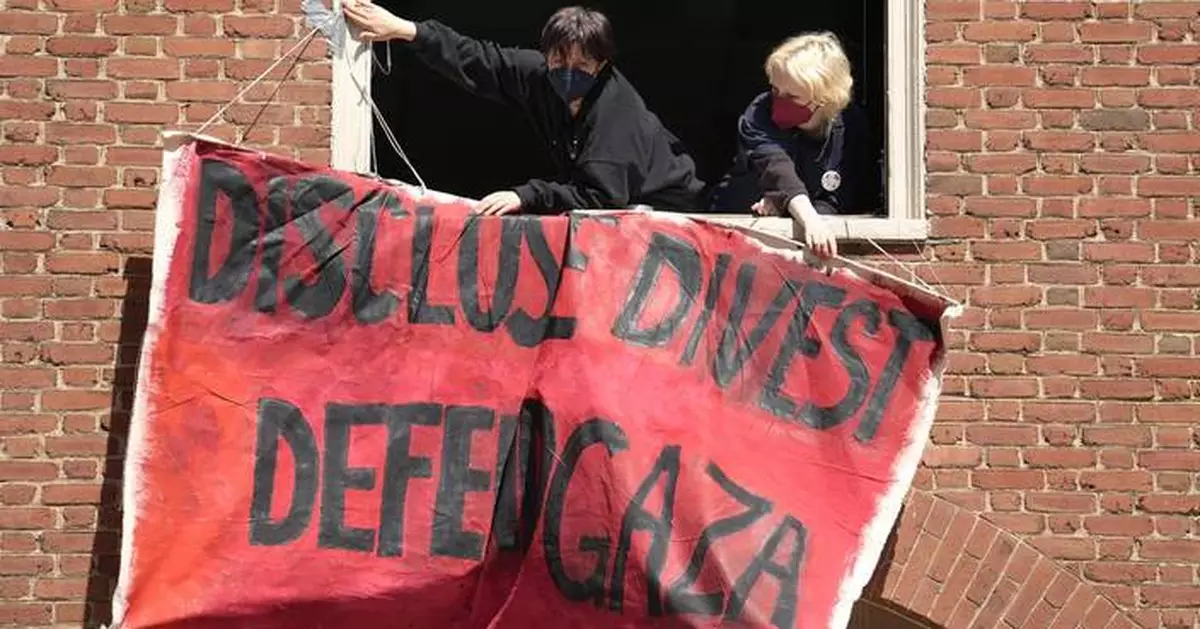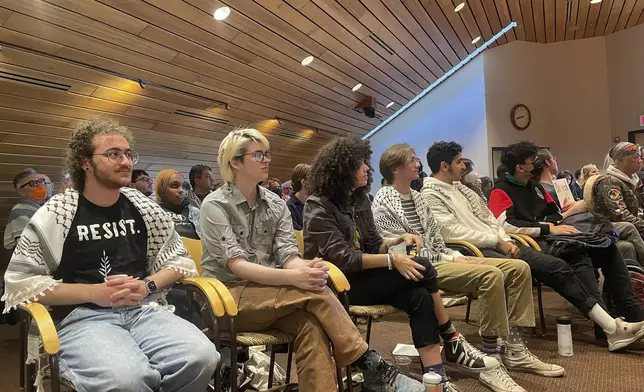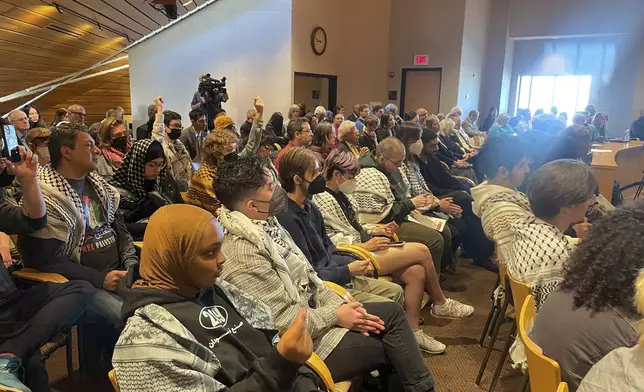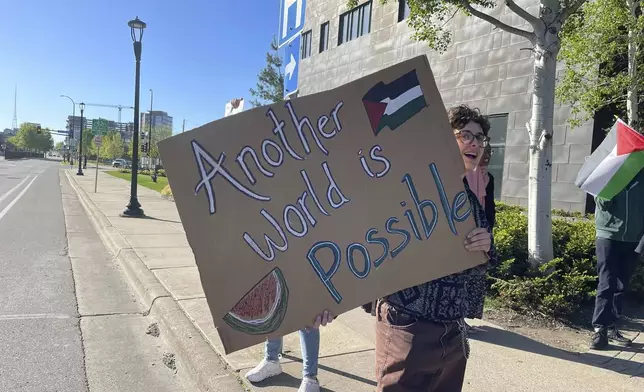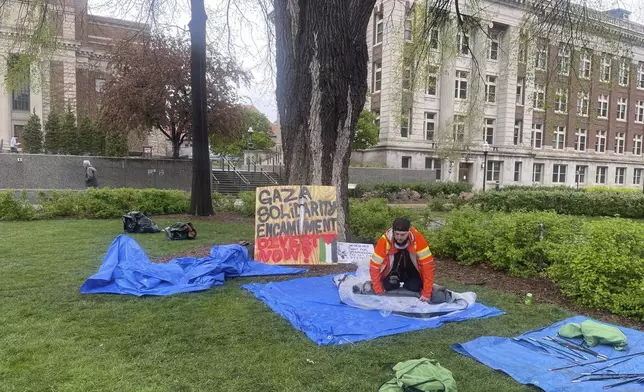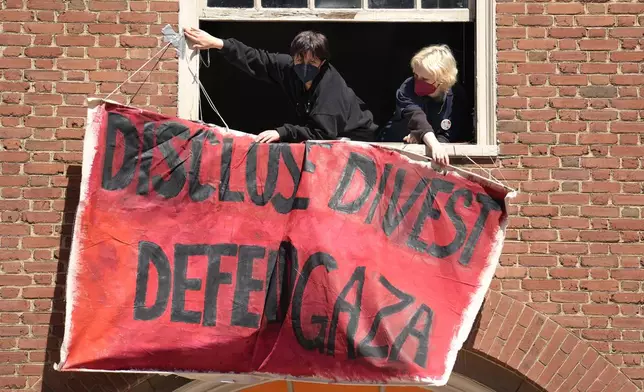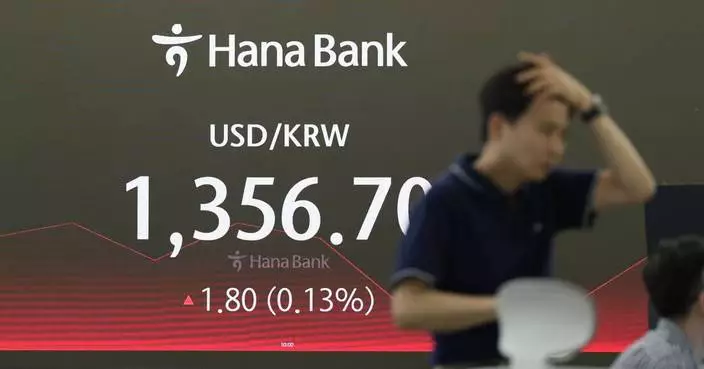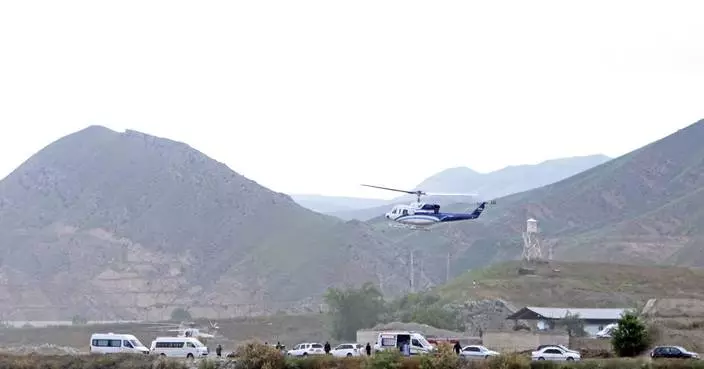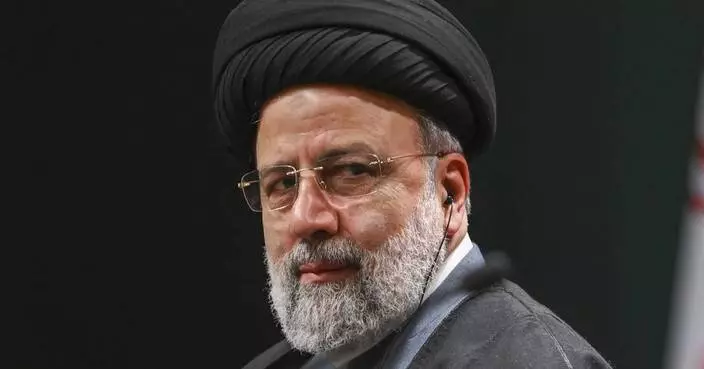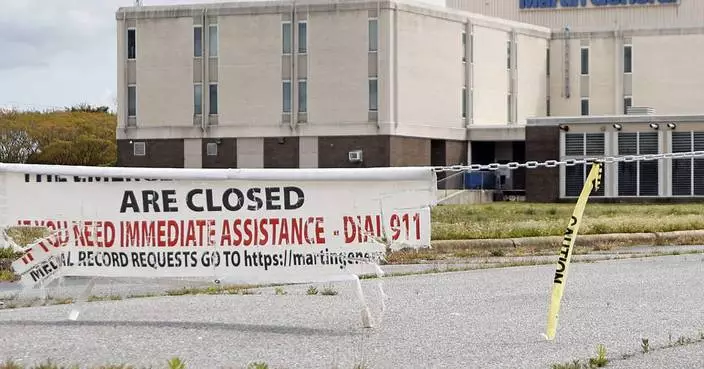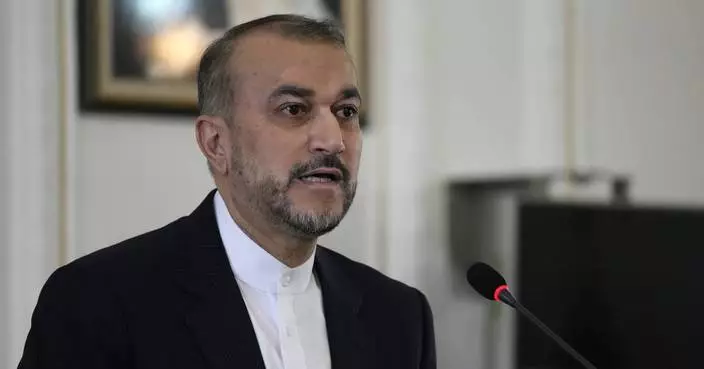MINNEAPOLIS (AP) — On college campuses across the country, a rallying cry of pro-Palestinian protesters has been “ Disclose, divest! We will not stop, we will not rest.”
Now some are winning the first of those two demands: Promises to provide information about how much university endowment money is invested in companies profiting from the Israel-Hamas war.
Click to Gallery
FILE - Activists hang a placard from a window of an upper floor of a building at Rhode Island School of Design, Tuesday, May 7, 2024, in Providence, R.I., as students and supporters, who have taken over a portion of the building, are demanding that the school condemn Israel's war effort in Gaza, and that the school divest from investments that benefit Israel. (AP Photo/Steven Senne, File)
MINNEAPOLIS (AP) — On college campuses across the country, a rallying cry of pro-Palestinian protesters has been “ Disclose, divest! We will not stop, we will not rest.”
Pro-Palestinian supporters attended a University of Minnesota's Board of Regents meeting on Friday, May 10, 2024, in Minneapolis to demand divestment from companies that profit off the Israel-Hamas war. The University of Minnesota disclosed this week that about $5 million of its $2.27 billion endowment investments — or less than a quarter of 1% — are tied to Israeli companies or U.S. defense contractors. (AP Photo/Trisha Ahmed)
Pro-Palestinian supporters demanding divestment from companies that profit off the Israel-Hamas war, hold signs outside as the University of Minnesota's Board of Regents meet on Friday, May 10, 2024, in Minneapolis. The University of Minnesota disclosed this week that about $5 million of its $2.27 billion endowment investments — or less than a quarter of 1% — are tied to Israeli companies or U.S. defense contractors. (AP Photo/Trisha Ahmed)
FILE - A graduate student in orange rolls up tents in front of a sign that says "Gaza Solidarity Encampment, Divest Now!" on the University of Minnesota campus in Minneapolis, Thursday, May 2, 2024. Earlier in the day, University of Minnesota officials announced an agreement with protesters to end the encampment on the Minneapolis campus. (AP Photo/Trisha Ahmed, File)
FILE - Activists hang a placard from a window of an upper floor of a building at Rhode Island School of Design, Tuesday, May 7, 2024, in Providence, R.I., as students and supporters, who have taken over a portion of the building, are demanding that the school condemn Israel's war effort in Gaza, and that the school divest from investments that benefit Israel. (AP Photo/Steven Senne, File)
As part of that effort, the University of Minnesota, for one, disclosed this week that about $5 million of its $2.27 billion endowment investments — or less than a quarter of 1% — are tied to Israeli companies or U.S. defense contractors.
To Ali Abu, a 19-year-old University of Minnesota student and member of Students for Justice in Palestine, the disclosure is a first step. He was among more than a dozen students to stand before the university’s Board of Regents on Friday and demand further action.
“That chant isn’t a bluff," he said, adding: "We will truly not stop. And we will truly not rest until this university divests.”
But Jewish leaders have raised concerns, and endowment experts say the potential fallout from disclosure is hard to predict. Transparency, they say, has pros and cons.
“I think the broader trend towards transparency is probably healthy. In response to a very charged situation, I think people get nervous about it. Once the information is there, what’s done with that information?” said Kevin Maloney, a former investment manager who is now chair of the finance department at Bryant University in Rhode Island.
Endowments face little federal regulation compared with other fundraising institutions. And there have long been calls for more transparency.
Maloney said the risk is that portfolio managers might just say they don't want to bother with all the attention.
University endowments have increasingly been targeted for divestment by activists.
Over the last decade, students have pushed universities to cut financial ties with fossil fuel producers, weapons manufacturers, tobacco companies and prison firms. Often it has been done in tandem with students in the Boycott, Divestment and Sanctions movement, which seeks to cut ties with Israel and companies that support it.
Most colleges have held firm, saying their investments provide financial aid for future generations and should be protected from politics.
Neal Stoughton, a professor of finance at the University of Waterloo in Canada, said colleges are wary of releasing information because they don’t want competition from other universities or institutions. He likened it to billionaires’ reticence to share investment tips.
“Those types of people don’t tell you exactly where all their money is,” said Stoughton, the former director of the Endowment Research Center at Vienna University of Economics and Business in Austria. He is currently doing research and consulting at the University of Arizona.
At the University of Michigan, officials responded to recent calls for divestment by saying the institution's decades-old policy “is to shield the endowment from political pressures and to base our investment decisions solely on financial factors such as risk and return.”
Michigan’s policy allows for exceptions — it divested from tobacco companies and apartheid-era South Africa — but the bar “has intentionally been set extremely high.”
Officials disclosed only that there are no direct investments with Israeli companies and that indirect investments through funds amount to less than $15 million, a small fraction of the university’s $18 billion endowment.
Universities also cite the complexities around divestment. Much of endowments is often held in investment funds that bundle large numbers of assets together. It can be difficult to trace exactly where the money goes, and universities generally can’t pick and choose among a fund’s investments.
Other schools that have opted for the disclosure route include Northwestern University outside Chicago, which said in an agreement posted to its website last week that it will answer questions from any internal stakeholder about holdings.
The University of California, Riverside, also said it would start posting information online with a goal of "full disclosure of the list of companies in the portfolio and the size of the investments.”
At the University of Minnesota, the decision to provide more endowment details came as part of a deal to end protesters' encampment on the Minneapolis campus.
At one point nine students were arrested. Among them was Jasper Nordin, who told regents the university should not support “turning innocent people into refugees.”
Tye Gregory, CEO of the Jewish Community Relations Council, said disclosure will just lead to calls for divestment and that risks harming Jewish students without actually changing the course of the fighting in Gaza.
“From my experience, unless you give in to all of their demands, they’re not going to relent against the administration,” he said. “And the administrations are not in a position to give in to all their demands. So my advice — not that they’re going to take it — is just not to negotiate on that. You’re not going to make them happy.”
Charlie Maloney, who is the the incoming president of the school's chapter of the Jewish campus organization Hillel, told the regents the last few months had been “scary” and that “singling out Israel for condemnation feels anti-Semitic.” Earlier, some of the pro-divestment speakers said they were Jewish.
Abu, who is one of the protest leaders, said the students want full disclosure of all investments, beyond just the $5 million university leaders have provided details about already.
The information provided by the school names different companies the university has holdings in through investments or through funds. The list includes defense contractor Honeywell, which protesters have singled out during rallies. Honeywell did not immediately return an email message from The Associated Press seeking comment.
“The companies that we are demanding the university divest from profit from genocide,” said Donia Abu, a 22-year-old graduating student who has had family members killed in the fighting. “These companies indiscriminately terrorize and massacre our people and communities.”
The regents took no immediate action, their chair, Janie Mayeron, telling the students, “We have hard work before us.”
Hollingsworth reported from Mission, Kansas. Collin Binkley in Washington, D.C., contributed to this report.

Pro-Palestinian supporters attended a University of Minnesota's Board of Regents meeting on Friday, May 10, 2024, in Minneapolis to demand divestment from companies that profit off the Israel-Hamas war. The University of Minnesota disclosed this week that about $5 million of its $2.27 billion endowment investments — or less than a quarter of 1% — are tied to Israeli companies or U.S. defense contractors. (AP Photo/Trisha Ahmed)

Pro-Palestinian supporters attended a University of Minnesota's Board of Regents meeting on Friday, May 10, 2024, in Minneapolis to demand divestment from companies that profit off the Israel-Hamas war. The University of Minnesota disclosed this week that about $5 million of its $2.27 billion endowment investments — or less than a quarter of 1% — are tied to Israeli companies or U.S. defense contractors. (AP Photo/Trisha Ahmed)

Pro-Palestinian supporters demanding divestment from companies that profit off the Israel-Hamas war, hold signs outside as the University of Minnesota's Board of Regents meet on Friday, May 10, 2024, in Minneapolis. The University of Minnesota disclosed this week that about $5 million of its $2.27 billion endowment investments — or less than a quarter of 1% — are tied to Israeli companies or U.S. defense contractors. (AP Photo/Trisha Ahmed)

FILE - A graduate student in orange rolls up tents in front of a sign that says "Gaza Solidarity Encampment, Divest Now!" on the University of Minnesota campus in Minneapolis, Thursday, May 2, 2024. Earlier in the day, University of Minnesota officials announced an agreement with protesters to end the encampment on the Minneapolis campus. (AP Photo/Trisha Ahmed, File)

FILE - Activists hang a placard from a window of an upper floor of a building at Rhode Island School of Design, Tuesday, May 7, 2024, in Providence, R.I., as students and supporters, who have taken over a portion of the building, are demanding that the school condemn Israel's war effort in Gaza, and that the school divest from investments that benefit Israel. (AP Photo/Steven Senne, File)
JERUSALEM (AP) — The helicopter crash in which Iranian President Ebrahim Raisi, the country’s foreign minister and other officials were killed is likely to reverberate across the Middle East, where Iran’s influence runs wide and deep.
That's because Iran has spent decades supporting armed groups and militants in Lebanon, Syria, Iraq, Yemen and the Palestinian territories, allowing it to project power and potentially deter attacks from the United States or Israel, the sworn enemies of its 1979 Islamic Revolution.
Tensions have never been higher than they were last month, when Iran under Raisi and Supreme Leader Ayatollah Ali Khamenei launched hundreds of drones and ballistic missiles at Israel in response to an airstrike on an Iranian Consulate in Syria that killed two Iranian generals and five officers.
Israel, with the help of the United States, Britain, Jordan and others, intercepted nearly all the projectiles. In response, Israel apparently launched its own strike against an air defense radar system in the Iranian city of Isfahan, causing no casualties but sending an unmistakable message.
The sides have waged a shadow war of covert operations and cyberattacks for years, but the exchange of fire in April was their first direct military confrontation.
The ongoing war between Israel and Hamas has drawn in other Iranian allies, with each attack and counterattack threatening to set off a wider war.
It's a combustible mix that could be ignited by unexpected events, such as Sunday's deadly crash.
Israel has long viewed Iran as its greatest threat because of Tehran's controversial nuclear program, its ballistic missiles and its support for armed groups sworn to Israel's destruction.
Iran views itself as the chief patron of Palestinian resistance to Israeli rule, and top officials for years have called for Israel to be wiped off the map.
Raisi, who was a hard-liner viewed as a protégé and possible successor of Khamenei, chastised Israel last month, saying “the Zionist Israeli regime has been committing oppression against the people of Palestine for 75 years.”
“First of all we have to expel the usurpers, secondly we should make them pay the cost for all the damages they have created, and thirdly, we have to bring to justice the oppressor and usurper," he said.
Israel is believed to have carried out numerous attacks over the years targeting senior Iranian military officials and nuclear scientists.
There is no evidence Israel was involved in Sunday's helicopter crash, and Israeli officials have not commented on the incident.
Arab countries on the Persian Gulf have also long viewed Iran with suspicion, a key factor in the decision of the United Arab Emirates and Bahrain to normalize relations with Israel in 2020, and of Saudi Arabia to consider such a move.
Iran has provided financial and other support over the years to the Palestinian militant group Hamas, which led the Oct. 7 attack into Israel that triggered the Gaza war, and the smaller but more radical Palestinian Islamic Jihad, which took part in it. But there is no evidence that Iran was directly involved in the attack.
Since the start of the war, Iran's leaders have expressed solidarity with the Palestinians. Their allies in the region have gone much further.
Lebanon's Hezbollah militant group, Iran's most militarily advanced proxy, has waged a low-intensity conflict with Israel since the start of the Gaza war. The two sides have traded strikes on a near-daily basis along the Israel-Lebanon border, forcing tens of thousands of people on both sides to flee.
So far, however, the conflict has not boiled over into a full-blown war that would be disastrous for both countries.
Iran-backed militias in Syria and Iraq launched repeated attacks on U.S. bases in the opening months of the war but pulled back after U.S. retaliatory strikes for a drone attack that killed three American soldiers in January.
Yemen's Houthi rebels, another ally of Iran, have repeatedly targeted international shipping in what they portray as a blockade of Israel. Those strikes, which often target ships with no apparent links to Israel, have also drawn U.S.-led retaliation.
Iran's influence extends beyond the Middle East and its rivalry with Israel.
Israel and Western countries have long suspected Iran of pursuing nuclear weapons in the guise of a peaceful atomic program in what they see as a threat to non-proliferation everywhere.
Then-President Donald Trump's withdrawal from a landmark nuclear pact between Iran and world powers in 2018, and his imposition of crushing sanctions, led Iran to gradually abandon all the limits placed on its program by the deal.
These days, Iran is enriching uranium to up to 60% purity — near weapons-grade levels of 90%. Surveillance cameras installed by the U.N. nuclear agency have been disrupted, and Iran has barred some of the agency's most experienced inspectors. Iran has always insisted its nuclear program is for purely peaceful purposes, but the United States and others believe it had an active nuclear weapons program until 2003.
Israel is widely believed to be the only nuclear-armed power in the Middle East but has never acknowledged having such weapons.
Iran has also emerged as a key ally of Russia following its invasion of Ukraine, and is widely accused of supplying exploding drones that have wreaked havoc on Ukraine's cities. Raisi himself denied the allegations last fall in an interview with The Associated Press, saying Iran had not supplied such weapons since the outbreak of hostilities in February 2022.
Iranian officials have made contradictory comments about the drones, while U.S. and European officials say the sheer number being used in the war in Ukraine shows that the flow of such weapons has intensified since the war began.

In this photo provided by Moj News Agency, rescue teams' vehicles are seen near the site of the incident of the helicopter carrying Iranian President Ebrahim Raisi in Varzaghan in northwestern Iran, Sunday, May 19, 2024. A helicopter carrying President Raisi, the country's foreign minister and other officials apparently crashed in the mountainous northwest reaches of Iran on Sunday, sparking a massive rescue operation in a fog-shrouded forest as the public was urged to pray. (Azin Haghighi/Moj News Agency via AP)

An Iranian woman prays for President Ebrahim Raisi in a ceremony at Vali-e-Asr square in downtown Tehran, Iran, Sunday, May 19, 2024. A helicopter carrying President Raisi, the country's foreign minister and other officials apparently crashed in the mountainous northwest reaches of Iran on Sunday, sparking a massive rescue operation in a fog-shrouded forest as the public was urged to pray. (AP Photo/Vahid Salemi)

People pray for President Ebrahim Raisi in a ceremony at Vali-e-Asr square in downtown Tehran, Iran, Sunday, May 19, 2024. A helicopter carrying President Raisi, the country's foreign minister and other officials apparently crashed in the mountainous northwest reaches of Iran on Sunday, sparking a massive rescue operation in a fog-shrouded forest as the public was urged to pray. (AP Photo/Vahid Salemi)

FILE - People gather around a component from an intercepted ballistic missile that fell near the Dead Sea in Israel, Saturday, April 20, 2024. The apparent crash of a helicopter carrying Iranian President Ebrahim Raisi, the country's foreign minister and other top officials is likely to reverberate across the Middle East. Tensions have soared since the start of the Israel-Hamas war, and Israel and Iran directly traded fire for the first time ever in April. (AP Photo/Itamar Grinberg, File)

FILE - Iranian worshippers chant slogans during an anti-Israeli gathering after Friday prayers in Tehran, Iran, Friday, April 19, 2024. The apparent crash of a helicopter carrying Iranian President Ebrahim Raisi, the country's foreign minister and other top officials is likely to reverberate across the Middle East. Tensions have soared since the start of the Israel-Hamas war, and Israel and Iran directly traded fire for the first time ever in April. (AP Photo/Vahid Salemi, File)







